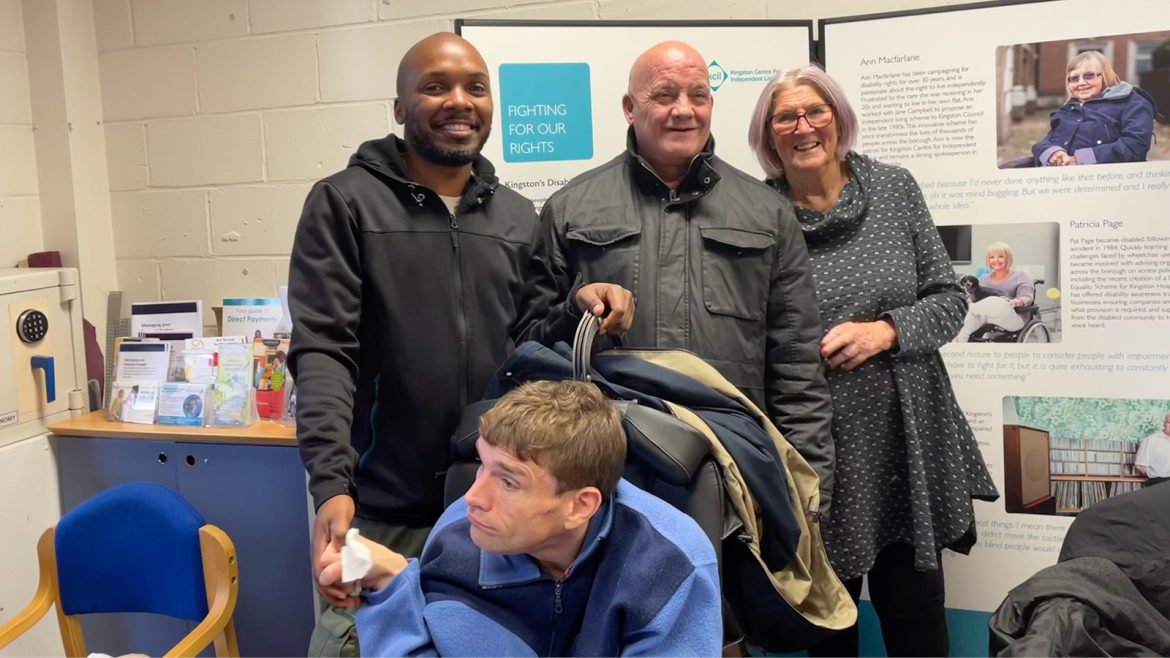Wrapped in a thick black jumper, hands clutching a steaming hot cup of coffee, 60-year-old Derek Bexley smiles at the five people sitting with him at his local warm bank. His voice is hoarse and his eyes drift as he talks about his life and the journey it has been to get where he is.
Bexley suffers from epilepsy and poor mental health and the cold does not help. These days he cannot afford to stay warm which is why the warm bank at Kingston Centre for Independent Living (KCIL), which opened on November 8, is a blessing for him. “Times are getting very hard. Years ago, I had no blankets on the bed or shoes on my feet and it’s getting like that again for people,” Derek says.
The hard times he refers to are affecting people across the UK. Since 2021, the cost of living has been increasing to the point it has become a national crisis. According to the UK Parliament, the annual rate of inflation reached a 41-year high in October which has affected the affordability of goods and services.
As Jo Stafferton, KCIL office manager says, the crises never stop. First there was COVID and then came the current cost-of-living crisis made worse by Russia’s brutal invasion of Ukraine. “We’re entering a very difficult time for disabled people, so we felt we had to do our bit to support people alongside other community spaces doing the same,” says Stafferton.
KCIL is not the only space doing what it can to keep people warm. Surrey County Council reported 70 warm banks opening in the county since October and many more unofficial warm spaces welcoming people in from the cold. Locals like Bexley are relying on these spaces after increasing energy prices mean an estimated 8.2 million UK households will be in fuel poverty by the end of 2022 according to National Energy Action (NEA).
Keeping warm at home
When Bexley, who lives alone, is not at the KCIL warm bank, he does what he can to keep warm at home. In the evenings, he switches on a small lamp in his living room, wraps up in two quilts, a small blanket, and usually falls asleep like this. During the coldest mornings he tries to have a hot breakfast, often a cup of coffee. “You’ve got to keep going and going every day. Now times are difficult everyone should be helping other people,” Bexley says.
The KCIL team agrees which is why they opened the warm bank, also called the Warm Welcome Café. Stafferton says it opened to meet the changing needs of the disabled community and it offers warmth, energy saving advice and help with financial support applications. She adds KCIL visitors are often unaware of the help they are entitled to.
Bexley’s newest challenge is simply staying warm which is essential because of his epilepsy. Although medication manages Bexley’s seizures there are added risks from cutting back on energy usage. He says he only turns on his small lamp when it is necessary and still has not used his heating, despite temperatures dropping to 5C in the winter evenings.
Living like this increases Bexley’s chance of epileptic fits according to Epilepsia, the official journal of the International League Against Epilepsy. The cold and minimal lighting could even send him to hospital. “If the ambulance came and saw the lights off, I’d be in trouble,” Bexley says.
It is not only people with epilepsy whose health is put at risk by the cold. NEA data says around 12,000 people die every year because of fuel poverty. The repercussions of living in a cold home are undeniable. People in fuel poverty can face respiratory infections, stress on the heart and it can affect mental health according to the charity Friends of the Earth.
For the people most at risk and anyone else needing that bit of extra support, warm banks provide a few hours of warmth, companionship and security. Nevertheless, Bexley says: “I’m used to being cold.” He remembers his mum sold rags on Petticoat Lane to look after him as a child and his eyes drift as he recalls her voice saying: “I’ll leave you three things, never get into trouble with the police, always pay your bills and always look after yourself.”
Food banks on the rise
It has become more difficult than ever to follow his mum’s advice. A survey by Savanta found one in five low-income UK households are in arrears on energy bills. Bexley does what he can to stay on top of things including using food banks, although he says he feels guilty when he does.
His voice faltered and tears escaped his eyes while he told the group about a food bank in Surbiton he visited recently. “It was packed full of people,” says Bexley. “I got to the door but then I felt guilt for taking anything because there’s people worse off than me.” The busy food bank Bexley saw has become a common scene of the current crisis.
Trussell Trust and the Independent Food Aid Network (IFAN) recorded over 2,500 food banks have opened in the UK since 2000. In the past year they have delivered over 2.2 million three-day food parcels as people across the country turn to them for the essentials they cannot afford. Some food banks, like the Square 1 Café in Chessington and New Malden, have evolved to answer the growing need for warmth in their communities.
The New Malden location was originally opened by Tony Williams in 2021 to welcome people out of Covid restrictions. It developed by responding to the changing crises and became a popular food and warm bank. On August 28 the model was reproduced, and the second Square 1 Café opened in Chessington which, on average, 33 people visit when it’s open on Fridays.
Around 29 food banks have opened in Kingston and the surrounding area as well as others that are not registered with the Trussell Trust. They offer essential, often long-life food items to ease the cost of living. Some, like Chessington and New Malden, provide homemade cakes and sandwiches for people to enjoy in the Café or to take home.
Williams says he hopes others will use the model he created to open even more of these spaces as heating and food prices get higher. “I bring people here to see it and feel it and it inspires people to think about starting one themselves,” he says.
Cost of living crisis affecting livelihoods
One user of the Chessington space is Chrissy Martin who started visiting the Square 1 Café in October. She is unsteady on her feet but has a tight grasp on the sandwich that has been brought to her. Martin sits with four other visitors all discussing their relief at warm banks opening. Differently to her new friends, she has already turned her heating on at home because she suffers from fibromyalgia.
Fibromyalgia is a long-term condition that causes chronic pain all over Martin’s body and cold temperatures are extremely damaging to her health. “If I get cold then I start seizing up and I have to go to hospital,” she says.
The NHS estimates one in 20 people are affected by fibromyalgia and the cold weather affects them in the same way it does Martin. Using the warm bank means she can avoid turning her heating on at home all day and can save money for next month’s bills. She also uses the food bank housed in the same room and meets people with similar anxieties over the future.
One of them is Sue Stevens who visted the Chessington Café for the first time on November 11 with her neighbour Paul Hickmott. She infects the table with her cheeky sense of humour even in serious conversations on the cost of living. Stevens is a retired NHS worker and has paid into a pension her entire working life. She has lived off this pension for around five years but says money that used to last a month has started to disappear after two weeks.
Stevens is not the only one to notice the change. The Office of National Statistics reported 93% of UK adults have experienced an increase in their cost of living in the past year. For people on fixed incomes there is no extra money to cover this escalation.
“Nobody knows if they’re going to even eat next year, let alone heat anything,” says Stevens. Even though she receives government help towards her heating bills she thinks the prices were too expensive before the crisis and the money she receives does not help pay the original costs.
The UK Government set up financial support schemes to offset additional heating costs. Last month the six-month energy bill support scheme began which provides a £400 discount to eligible households until March. Stevens says this is not enough to fix the crisis which she thinks UK leadership and politicians are responsible for.
“This isn’t ending in my lifetime,” says Stevens. “They promise you the world but look what we’re living in.” She holds up her hands and gestures in disbelief to the room sheltering scores of people from the cold.
Like the government schemes, warm banks are not a permanent or perfect solution to the crisis. The visitors to KCIL warm bank and the Square 1 Cafés will have to finish their coffees, say their goodbyes, and brave the cold again when the doors close for the day.
Nevertheless, for now, warm banks are a saviour that protect the health and finances of locals like Bexley and Martin. Their support helps Bexley stay positive but the emotion can still overwhelm him sometimes. He said: “The tears are in your eyes all the time, but you think to yourself, come on, I’ve still got my mum.”





